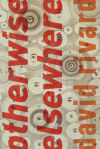Otherwise Elsewhere
What is poetry if not, on some level, the embodiment of otherwise and elsewhere? The life beyond the very line that brings it into existence. The place the words evoke, but where they are a placeholder, so to speak. Poetry’s ability, its obligation, perhaps, to evoke what is not there or what is beyond even the concept of “there.” Rivard is preoccupied with otherwise-ness, with elsewhere-ness: “all those lives & destinations that might have been mine, but weren’t— / because there are two kinds of distance between us—towards, & away.”
What is poetry if not, on some level, the embodiment of otherwise and elsewhere? The life beyond the very line that brings it into existence. The place the words evoke, but where they are a placeholder, so to speak. Poetry’s ability, its obligation, perhaps, to evoke what is not there or what is beyond even the concept of “there.” Rivard is preoccupied with otherwise-ness, with elsewhere-ness: “all those lives & destinations that might have been mine, but weren’t— / because there are two kinds of distance between us—towards, & away.”
He turns his awareness of, indebtedness to, and interest in otherwise and elsewhere into satisfying and acutely insightful verse:
know how you suddenly pass through yourself
as the simplest
of questions—like,
you’ll have to sign
your name how many times
in this life?
A fixed number you
can never know.
(from “Outbound Fall River 1967”)
Another time, another place, a part of the poet and not yet part of him, as the past and the future always are really one and the same, both aspects of “else” and “other.”
“Where am I headed? Where will the touch go after I shake the carpenter’s hand,” the poet wonders in “At Large,” pondering how every small act takes place endlessly in an “elsewhere” and “otherwise” that happens long past the moment we’re experiencing and people we will never know or see.
The book becomes an obsessive accumulation of otherwises and elsewheres: “why return to what yesterday seemed to be becoming / before it became today”; “everyone feels that, everybody / understands // that somewhere & everywhere / a boy of 14 is out riding his bike”; “insert here, at the moment, the wrath of the janjawee / in Hashaba or elsewhere sweatshops / approved by theorists of economic development”; “who heals he used to”; “the iron earthiness of your mother & father outgrown, left behind”; “‘stop to let it pass,’ so you can see what else is there”; “in 1968, unknown to one another”; “in that desert half a world away”; “Not to be infinite, despite the child you once were”; and “you me he she it we they”—the first line of the poem “Master of the Offer” (the ultimate sense of otherness, those personal pronouns). Finally, “beyond all this was compassion,” the poet writes in the collection’s last poem, “Lightning with its Glare.” Beyond every scene described, beyond every poem, is the compassion for what is elsewhere and otherwise, what we are not, but can imagine; what we do not see, but may remember, predict, or create; what Rivard can bring to life through his poems.
In “Coffeehouse, Eastern Standard Time” (as opposed to coffeehouses in other time zones, elsewhere), he writes:
Don’t believe poetry –
poetry, which would use metaphor
to give grace
to the grief of everyday
homemade human failure,
indifference. As if words had not
weight, & didn’t accumulate
in you. Poetry? The evidence is skimpy
But, I don’t believe, after all, that Rivard dis-believes in poetry. He knows that every life is somehow what it is precisely because of what it isn’t. Poetry, perhaps more than any other tool at our disposal, helps us get just a little bit closer to that “isn’t,” to what was, or is, or will be, or could be otherwise and elsewhere.





